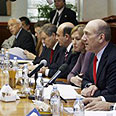
A weak government
צילום: רויטרס
Alliance of the weak
Truce deal taking shape because two weak governments want ceasefire
As of 6 am on Thursday Israel will grant Hamas recognition as a legitimate player in Palestinian and regional politics. In exchange, we get some kind of lull for Gaza-region residents. This, in summary, is the essence of the deal we finalized with Egypt.
Everyone whines and complains about this agreement. They say it is bad and fragile, and that it won’t last long. Yet this arrangement is taking shape for one reason: The two weak governments on both sides of the Gaza fence have an interest in seeing the deal succeed. Only one element has an interest in sabotaging this deal: The Iranians. They will make an effort to unravel it through the Islamic Jihad organization. This is where Hamas will be tested: Is it indeed an Iranian satellite, or does it only exploit Tehran for its own needs?
So everything that has happened and will happen in the day before the truce is a game: Who will emerge as “the man,” who will deliver the last blow, and who will fight to the last moment for its truce terms? This is what Hamas is doing, and this is what we’re doing as well.
Amos Gilad did not travel to Egypt Tuesday with new insights and wasn’t expected to return from there with anything new. After all, everything was finalized ahead of his trip. Yet he traveled to Cairo to make it appear that we haven’t yet accepted the deal before our terms are fully accepted. Therefore, on Tuesday we saw attempts to blur the fact that Israel has already agreed to the lull.
Hamas, meanwhile, is saying that it does not intend to assume responsibility for the actions of the smaller terror groups. Yet all sides know that Hamas already reached agreement with those groups; yet it’s playing the game till the last moment. Hamas had demands that it was forced to renounce at the end of the day, such as an immediate and unconditional opening of the Rafah Crossing, an endless list of goods to be allowed into the Strip, and a linkage between Gaza and the West Bank.
Meanwhile, Israel demanded that Gilad Shalit be included in the deal – and didn’t get it. By the way, it knew in advance it won’t get it. On the other hand, it managed to secure an Egyptian pledge on the question of curbing smuggling efforts. This will be presented to the Israeli public as one of the major achievements of this deal.
What has changed?
For our political leadership, showing some kind of achievement on the Gilad Shalit front has crucial importance for domestic reasons. It has to be a quick achievement that will appear soon after the lull goes into effect, a truce that is being harshly criticized as it is. The Egyptians managed to come up with the formula that would grant Israel’s leaders the required achievement. Egypt was able to convince Hamas to arrive in Cairo for intense negotiations on Shalit’s release about a week after the lull goes into effect, and on condition it will be maintained, of course.Now, security officials in Israel expect Egypt to convince Hamas to be more flexible on the list of prisoners it wishes to release and present other lists that would enable Israel to choose the detainees it can afford to release on the eve of elections. There will be no surprise if in exchange for such flexibility, Israel too will be asked to show flexibility in terms of the number of prisoners to be released, as well as a change to the definition of prisoners with “blood on their hands.” It is possible that the names will be examined individually and graded in line with their “level of risk.” We won’t be surprised to suddenly discover that many of the “heavy-duty prisoners” demanded by Hamas have become very old or suffer from terminal disease.
The lull is premised on the principle of reciprocity. Should quiet prevail, within 3-4 days Israel will renew the transfer of goods into the Strip to an extent that will gradually grow. The quantity of goods that will be transported immediately will be 30% larger than the current scope. As the lull grows longer, Israel will gradually permit a wider range of goods to enter Gaza compared to what was going in this past year. This will include raw materials such as cement and iron, as well as materials vital for agricultural needs.
One surprise is that the list of goods requested by Hamas to be allowed into the Strip includes goods that are not staples. As it turns out, they have those basic needs. Yet they want clothes, shoes, and sweets; even cakes and cookies from Israel. In any case, there will be no transport of goods from the Strip into Israel.
Yet in the face of the agreement that has already been reached, one question emerges: If this deal is suddenly so vital to the State of Israel’s interests, why was it postponed all the time? After all, it was on the table in its current format, more or less, for long months already. What has changed?










